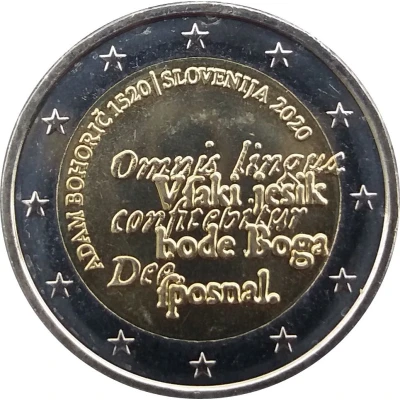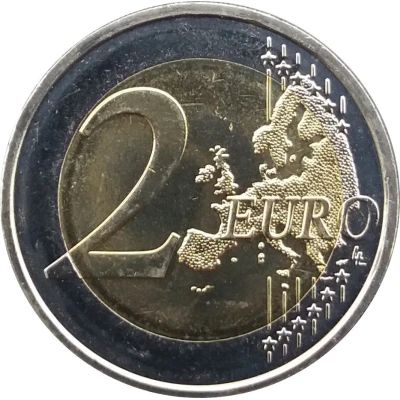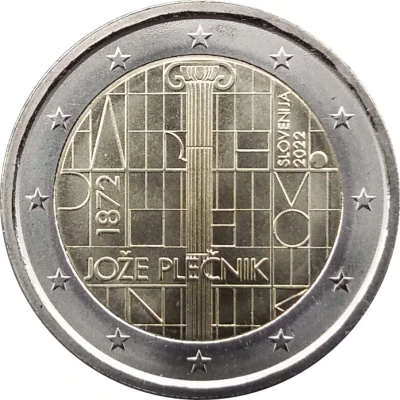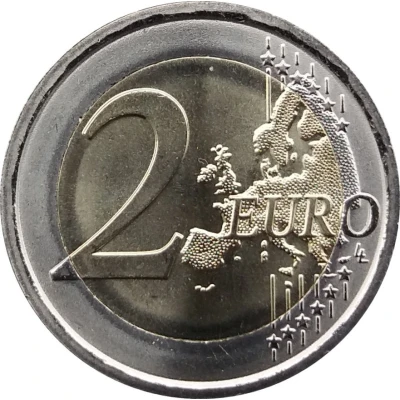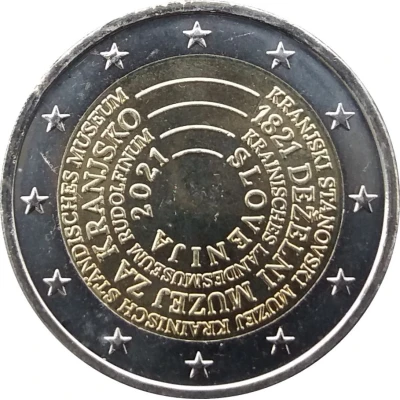
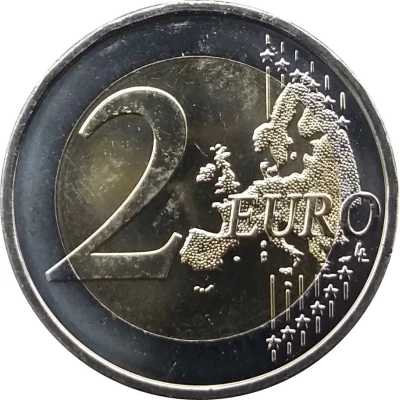

2 Euros Provincial Museum for Carniola
2021 year| Bimetallic: nickel brass centre in copper-nickel ring | 8.5 g | 25.75 mm |
| Issuer | Slovenia |
|---|---|
| Period | Republic (1991-date) |
| Type | Circulating commemorative coin |
| Year | 2021 |
| Value | 2 Euros 2 EUR = USD 2.20 |
| Currency | Euro (2007-date) |
| Composition | Bimetallic: nickel brass centre in copper-nickel ring |
| Weight | 8.5 g |
| Diameter | 25.75 mm |
| Thickness | 2.2 mm |
| Shape | Round |
| Technique | Milled |
| Orientation | Medal alignment ↑↑ |
| Updated | 2024-10-07 |
| Numista | N#284827 |
|---|---|
| Rarity index | 10% |
Reverse
A geographical map of Western Europe spans the outer ring and inner core on the right side of the coin. The inscription 2 EURO is superimposed over the map of Europe, with the numeral “2” located in an open field representing the eastern Atlantic Ocean. 12 stars are located on the right side of the outer ring, with six stars atop the map of Europe and six stars below it; six vertical stripes cut across the inner core of the coin, visually connecting the upper and lower star segments.
Script: Latin
Lettering:
2 EURO
LL
Designer: Luc Luycx
Edge
Inscribed with Slovenia in Slovene.
Script: Latin
Lettering: SLOVENIJA •
Translation: SLOVENIA•
Comment
The National Museum of Slovenia (Slovene: Narodni muzej Slovenije) is located in Ljubljana, the capital of Slovenia. It is situated in the Center district of the city near Tivoli City Park. Along with the Slovenian Museum of Natural History, located in the same building, the National Museum of Slovenia is the country's oldest scientific and cultural institution. The museum has an extensive collection of archaeological artefacts, old coins and banknotes (in the numismatics department on the ground floor) and displays related to the applied arts.The museum was founded in 1821 as the "Estate Museum of Carniola" (German: Krainisch Ständisches Museum). Five years later, the Austrian Emperor Francis I decided to personally sponsor the museum and ordered its renaming to "Provincial Museum of Carniola". In 1882, the museum was renamed to "Provincial Museum of Carniola - Rudolfinum" in honour of the Crown Prince Rudolph.
After the establishment of the Kingdom of Serbs, Croats and Slovenes, the name was changed to "National Museum". In 1923 the ethnographic collections possessed by the museum were removed and placed in the new Slovene Ethnographic Museum and in 1933 much of its fine artwork was moved to the National Gallery of Slovenia. In 1944 the Slovenian Museum of Natural History (then known as the Museum of Natural Sciences) became independent despite being located in the same building. In 1953 the majority of archives were moved to the Gruber Palace.
Renamed to National Museum of Slovenia in 1992, today the museum is divided into Archaeological Department, a Numismatic Cabinet, a Department of Prints and Drawings and a Department of History and the Applied Arts.
Interesting fact
The interesting fact about this coin is that it features a unique design that showcases the rich history and culture of Carniola, a region in Slovenia. The obverse side of the coin depicts the Provincial Museum for Carniola, which is housed in a beautiful Baroque building in the city of Ljubljana. The reverse side features a stylized image of a Carniolan hound, a breed that originated in the region and is known for its loyalty and intelligence. The coin's bimetallic design, with a nickel brass center in a copper-nickel ring, adds an extra layer of visual interest and makes it stand out from other coins. Overall, this coin is a beautiful tribute to the history and culture of Carniola, and it would make a great addition to any coin collection.
Price
| Date | Mintage | VG | F | VF | XF | AU | UNC |
|---|---|---|---|---|---|---|---|
| 2021 | 500 | - | - | - | - | - | - |
Values in the table are based on evaluations by sales realized on Internet platforms. They serve as an indication only for 2 Euros (Provincial Museum for Carniola) 2021 coin.
